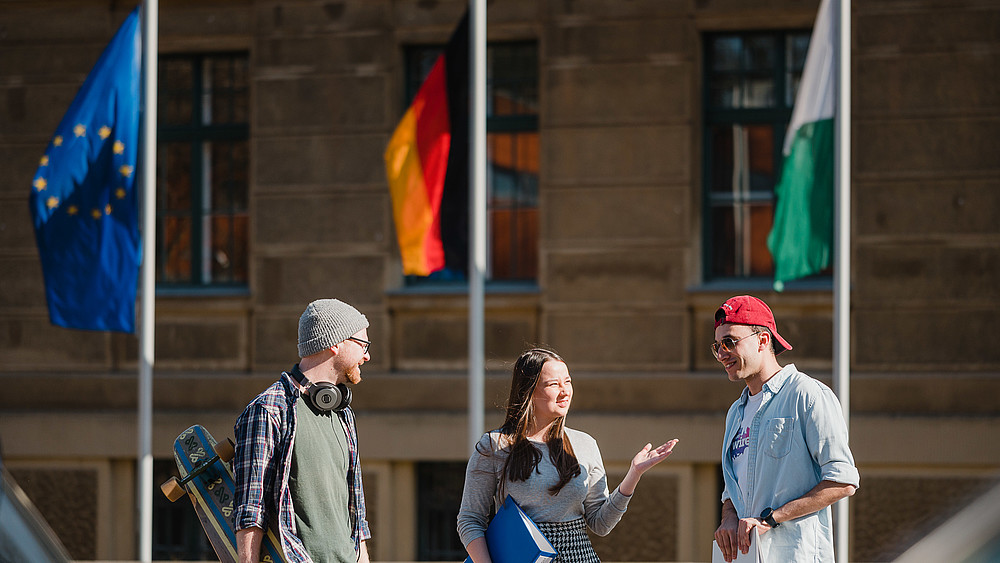Why the members and relatives of the HSZG are celebrating Europe Day on 27.04.2024 and celebrating with their Polish and Czech colleagues and neighbors in Zittau.

The European Union, founded in 1957 with the Treaty of Rome, experienced another great moment in 2004. Ten Eastern and Southern European states, including Poland and the Czech Republic, solemnly joined after a long and often arduous accession process. This not only completed an important stage in the post-socialist developments in Central and Eastern Europe since 1989, but also marked another important institutional step in overcoming the division of Europe that had existed since the Second World War. The European Union was no longer a Western European project, but can now claim to be pan-European in scope and foundation.
On April 27, 2024, we will celebrate Europe Day as the twentieth anniversary of the admission of the Central and Eastern European countries, and of particular importance to us, Poland and the Czech Republic.
Since its foundation in 1992, Zittau/Görlitz University of Applied Sciences has seen itself as an important academic institution in the three-country region formed by Poland (Dolnośląskie Voivodeship), the Czech Republic (Liberecký kraj) and Germany (East Saxony, Görlitz district). However, the accession of Poland and the Czech Republic to the EU in 2004 opened up opportunities for transnational regional communication and cooperation that had previously been excluded. These relate to opportunities for reciprocal stays abroad by students, teachers and researchers (e.g. as part of the EU's Erasmus program), joint courses, workshops and conferences as well as the establishment of bi- or even tri-national degree courses, such as those offered by the Technical University of Liberec (e.g. in the International Management course). In addition, over the last few decades, cooperation has been established in the field of scientific research and transfer into practice, ranging from mechanical and electrical engineering, computer science and economics to linguistics and social sciences. The European Union uses various program lines and instruments to support young scientists (e.g. via ESF-funded doctoral positions or junior research groups), scientific networking and basic and applied research projects (e.g. via the EU Horizon Program or ERDF, i.e. the regional development fund). The EU's Just Transition Fund (JTF) recently issued its first call for proposals, which provides considerable funding for research and innovation dynamics in regional structural change in European coal regions. The Zittau/Görlitz University of Applied Sciences successfully participated in this program; the first projects will start shortly.
In general, our university and our region have benefited greatly from exchange institutions and EU funding programs for many years. The EU and the three-country region not only act as a space and resource provider for teaching, research and knowledge transfer, without which academic life would be much poorer. The three-country region and European integration are also important subjects for teaching and research at our university and at universities in our neighboring countries close to the border. Topics such as cross-border mobility or energy supply, joint sustainability strategies, transnational economic regional development or questions of intercultural education and understanding as well as joint political projects for the future move us and are examined together with colleagues from Poland, the Czech Republic and other EU states.
Celebrating the European Union on 27 April in Zittau and highlighting the opportunities and successes to date, without which not only scientific, but also economic, social and cultural life in our region would be far less innovative and attractive, does not, of course, mean an uncritical attitude towards the current orientations, regulations and programs of the EU or individual states. This also applies to the academic sector. However, unlike right-wing and left-wing populist policy proposals, our criticism does not call into question the overwhelming achievements of the EU, especially as an order of peace, freedom and solidarity in Europe, but rather aims to use this as a basis to better solve existing problems in the coming decades, for example in the areas of migration policy, overregulation or sustainable economic and financial policy.
In the end, it is our daily task in the three-country region to take the initiative directly on the ground, to develop practical solutions and to sound out in transnational model projects what could be conceivable and liveable beyond previous rules and routines.
We look forward to the next twenty years of joint work in and for the European Union and its people.
Visit us at the Europe Festival in Zittau on 27.04.2024, find out about our work in Europe and talk to us about all this. We would be delighted.